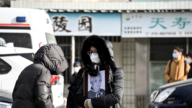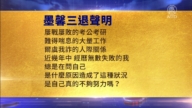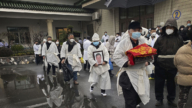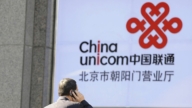【新唐人2014年06月10日訊】江西南昌市西湖區政府為了所謂的城市發展需要,要拆除兩個寺廟和一個尼姑庵,並合併建成一個大寺廟,取名「南海行宮」,安排比丘和比丘尼住在一起。中共究竟想幹甚麼?請看下面報導。
面臨拆除的江西南昌市三座寺廟中,「十里古寺」和「西觀寺」是男眾寺院,「淨業寺」是女眾寺院。「十里古寺」和「淨業寺」已經被拆。
據大陸媒體報導,三座寺廟合併後新建的「南海行宮」已經在3月動工。
報導說,「十里古寺」的僧人暫時解散,「淨業寺」的「慧仁法師」則帶著眾尼姑,暫時住在一個荒廢的小學裡。而政府正興建給僧、尼用的「過渡房」,兩排板房距離不到一米,而且門對開。
「西觀寺」的住持「燦池法師」表示,尼姑、和尚不能住在一起。哪怕「南海行宮」有40畝地,裡面劃一個院子或者圍一個圍牆給尼姑住,都是違反宗教法規的。
「十里古寺」的「寬性法師」認為,「南海行宮」這個名字也不妥,「宮」一般帶有道教色彩,道教一般稱出家人的道場為「宮、觀」,佛教則是「寺、庵、庵堂」。
有媒體指出,「行宮」是指古代京城以外供帝王出行時居住的宮室,現在有的賓館、酒店也假借「行宮」之名,但畢竟是享樂休閒場所。南昌市西湖區政府把佛門聖地叫做「行宮」,暴露了它無視宗教文化的存在。
南昌市民族宗教局宣稱,如何建、如何命名,都由「南海行宮管理小組」決定,小組中包括之前三座寺廟的負責人,但三位負責人都表示,從未參與「南海行宮」的興建和命名,他們純粹是「被掛名」。
北京社會活動家胡佳:「中共從來就是視信仰為無物的,在中國大陸,漢傳佛教受的打壓相對少一點,只是因為它們想把漢傳佛教做為一種利於它統治的工具,其實他們不尊重任何形式的宗教。中共拆廟、拆教堂已經蔚然成風了,而且出家修行的地方,你怎麼可能男女混在一起呢?這種事情就是褻瀆宗教、玷污宗教傳統的遺規。」
有網友評論說:忽然想起了文革時期,強迫僧尼還俗,讓和尚娶尼姑的事了。
據美國中文媒體《大紀元時報》發表的社論《九評共產黨》分析,共產黨的「哲學」和中國真正的傳統文化截然相反。傳統文化是敬畏天命的,孔子認為「死生有命、富貴在天」,佛家和道家思想都是有神論,相信生死輪迴、善惡有報。傳統文化中的「忠」絕不是「愚忠」,儒家講「民為貴,社稷次之,君為輕」,這都是中共無法接受的。
傳統文化既然以儒、釋、道思想為根,中共破壞文化的第一步就是清除宗教。建政之初,中共就開始毀寺焚經,沒收廟產、強迫僧尼學習馬克思主義,強迫僧尼參與勞動,乃至於以鼓勵僧尼結婚的方式來瓦解他們的信仰。譬如1951年「三八節」之前,湖南「長沙婦聯會」下令全省女尼必須在幾天之內決定結婚!而年輕力壯的男僧人被強迫參軍,送到戰場上去當炮灰!
曾為「六四」死難者舉辦超渡法會,並推動寺廟財務公開的中國佛教僧侶「聖觀法師」,5月17號被捕,至今仍未獲釋,他的弟子「果實法師」指出,當地政府興建「南海行宮」是為了利益。
中國佛教僧侶「果實法師」:「政府這麼做,肯定是為了自己的利益考慮,他要發展旅遊業或各方面,他可以創收,他感覺合併在一塊更好去撈錢嘛!」
據了解,興建「南海行宮」的土地,最初規劃為綠地,去年11月,當地政府突然變更為文化用地,引起寺廟和附近小區業主的不滿。
果實法師:「既然所謂的負責人都說被掛名的,這明顯是寺廟跟政府間利益衝突的問題。聖觀法師當年就是因為沒有跟別人同流合污,才被趕出來,實質是這個問題,名義上是說他六四的背景。因為他要推行寺廟財務公開制度嘛,對幾個利益團體會造成很大的影響。」
「果實法師」表示,中共宗教局、佛教協會、和統戰部控制著寺廟,是共產黨的臥底,不可能為出家人說話。出家人最終只能妥協,否則沒辦法生存。
採訪/朱智善 編輯/陳潔 後製/孫寧
Communist Regime Forces Nuns and Monks To Break Buddhist Law
In the name of urban development, the local government
of Nanchang City, Jiangxi Province, demolished two temples
and a nunnery, built a combined temple—The South China
Sea Palace—and forced nuns and monks into one locale.
The following is our report.
The Ten Mile Old Temple and the West Guan Temple are
monks ‘ temples and the Pure Karma Temple is a nunnery.
The Ten Mile Old Temple and the Pure Karma Temple
have been demolished by the local government.
According to Mainland media reports, construction
of a merged facility, the South Sea Palace, began in March.
The monks of the Ten Mile Old Temple
have temporarily disbanded.
The Pure Karma Temple nuns have relocated
to an abandoned elementary school.
The government is building temporary housing
for the nuns and monks.
Monks and nuns have been arranged in two rows of cubicles,
with their doors facing each other at a distance of less than a meter.
The West Guan temple administer, Chan Chi, told Mainland
media that nuns and monks cannot live together
even if on a piece of land as big as 40 acres that is divided
with a garden or wall.
It is in violation of Buddhist laws.
Monk Kuan Xing of the Ten Mile Old Temple explained
the new name, South Sea Palace, is not appropriate.
Palace is generally associated with the gathering of Taoists.
A temple or nunnery is for Buddhist gatherings.
A palace traditionally referred to an emperor ‘s living quarters
while traveling, but Chinese media now associates palaces
with hotels and resorts, which also use the name palace
for entertainment purposes.
This new name reflects the ignorance and negligence
of the local government towards the religion and culture.
The Religious Affairs Department of Nanchang City claimed
the name and the construction of the new palace was
decided on by a team which included the administrators
of the three abolished temples and nunnery.
However, all three administrators said they are not responsible
for the name and their participation was merely nominal.
Hu Jia, Beijing activist: “The Chinese Communist Party
(CCP) has considered belief to be nothing.
In China, Buddhism is relatively less suppressed because
the CCP has used Buddhism as a tool for the sake of control.
They have no respect for any religion.
It is the norm for the CCP to demolish temples or churches.
How can the nuns and monks be made to live together?
It is blasphemy to the Gods, religions and traditions."
Netizens commented that they were suddenly reminded
of the Cultural Revolution when monks and nuns
were forced to return to secular life and marry each other.
The Nine Commentaries on the Communist Party,
an editorial by the Epoch Times, pointed out the CCP’s
inherent ideological opposition to traditional Chinese culture.
The traditional culture is rooted in Confucianism, Buddhism
and Taoism.
The CCP ‘s first step in destroying traditional culture
was to extinguish the manifestation of the divine principles
in the human world, eradicating the three religions
corresponding to them.
The CCP confiscated temple property, forced monks and nuns
to study Marxism-Leninism in order to brainwash them,
and even forced them to do labor.
What is more absurd is that the CCP encouraged monks
and nuns to get married so as to disintegrate Buddhism.
For example, just before the March 8 Women ‘s Day in 1951,
the Women ‘s Federation in Changsha city, Hunan Province
ordered all nuns in the province to get married
within a few days.
Young and healthy monks were forced to join the army
and were sent to the battlefield to serve as cannon fodder.
Master Shen Guan was arrested on May 17 for conducting
a memorial to honor the victims of the June 4 Massacre
and promoting financial transparency with regard
to the new facility.
His disciple, Guo Shi, indicates that the South China Sea
Temple construction was in the interest of profiting.
Guo Shi: “The local government is certainly doing it
for the sake of money.
It is for tourism.
They feel the merge is better for making money."
The South China Sea Temple is designated to be built
in an unplanned area.
The local government ‘s decision last November to designate
the land for cultural construction caused debates
from local temples and residential property owners.
Guo Shi: “Even the administers have claimed
that it ‘s in name only.
It is clear that there is conflict between the temple
and the government.
Master Shen Guan was removed from the temple back then
because he refused to collude with others.
That was the problem.
Nominally, it was because of his background of participating
during the June 4 Student Movement.
He promoted financal transparency in the temple,
which affected the interests of several beneficiary groups."
Guo Shi indicates that the CCP, under the guise
of the Religious Affairs, the Buddhist Association,
and the United Front Work Department
controls the temples.
They care nothing of the monks or nuns.
For the sake of survival, nuns and monks have to compromise.
Interview/Zhu Zhishan Edit/ChenJie Post-Production/SunNing



























